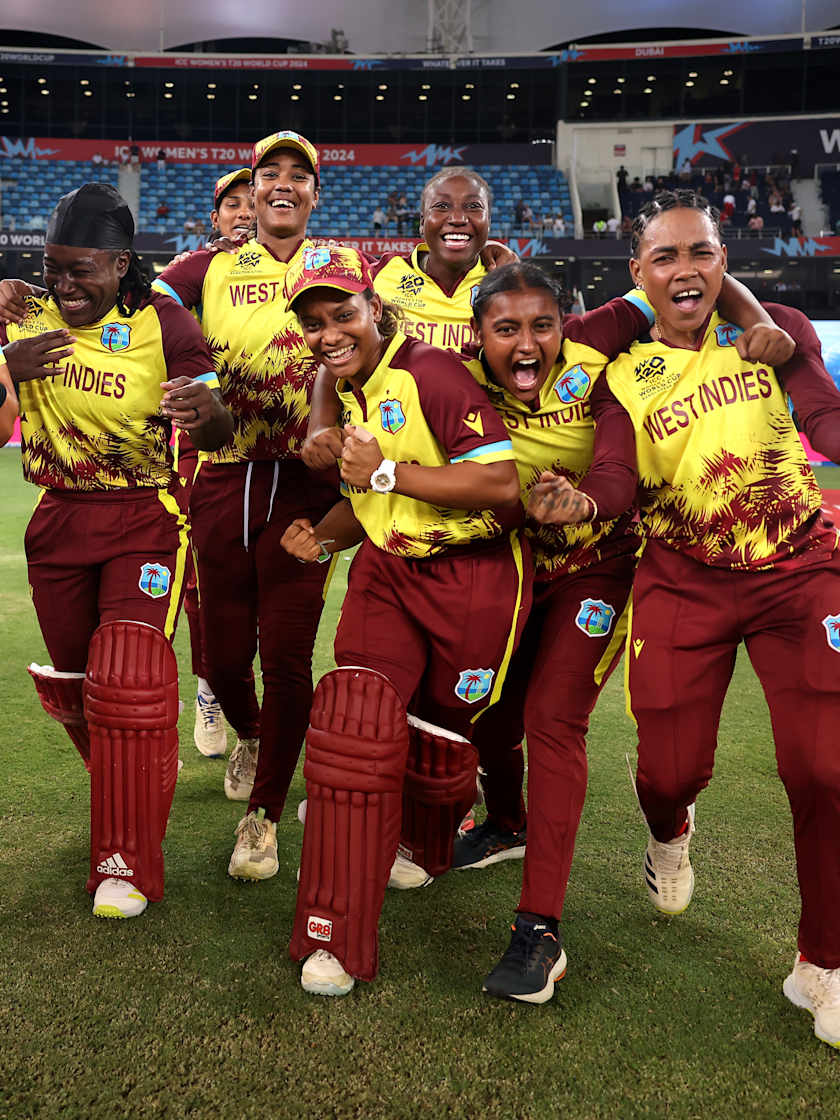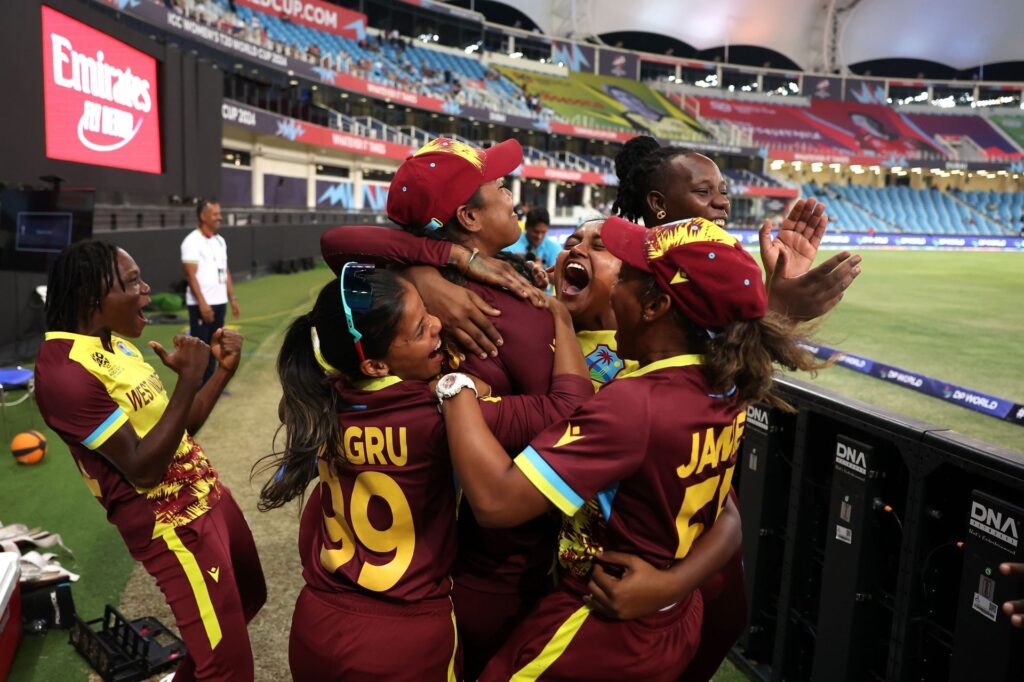West Indies pulled off a stunning upset in the Women’s T20 World Cup, defeating tournament favorites England by six wickets to secure their place in the semi-finals. This victory marked a dramatic turnaround for the Caribbean side, who had not beaten England since 2018 and had endured a 13-match losing streak. With this win, they not only topped Group B but also set up a semi-final clash with New Zealand in Sharjah.
England, despite being confident after winning their first three matches, were left shocked and eliminated, finishing third in their group due to an inferior net run rate. This marks only the second time that England has failed to reach the knockout stage of a T20 World Cup, the last being in 2010.
The win for West Indies was even more remarkable as they were without their former captain and seasoned batter, Stafanie Taylor, who is recovering from a knee injury. In her absence, Hayley Matthews, playing her 100th T20I, and Qiana Joseph, who scored a career-best 52, stepped up and carried the bulk of the run chase. Matthews hit her 14th half-century in T20Is, and together with Joseph, they shared a commanding 102-run opening partnership that propelled West Indies to victory.
England’s innings, anchored by Nat Sciver-Brunt’s unbeaten 57, faltered as the rest of the batting order failed to contribute significantly. To make matters worse, captain Heather Knight was forced to retire hurt on 21 due to a calf injury, leaving England 80 for 3 and disrupting their momentum. Despite a late fightback from Sciver-Brunt, England’s total of 141 for 7 was not enough to hold off the resurgent West Indies.
Afy Fletcher and Deandra Dottin led the West Indies’ bowling attack, taking four vital wickets for just 37 runs to give their side the upper hand and halt England’s progress. Fletcher, playing her first game of the tournament, was particularly effective, putting England on the back foot during the middle overs.
The turning point for England came early in their innings, after a poor start saw them slump to 34 for 3 in the seventh over. Despite Sciver-Brunt’s best efforts to rebuild the innings, England were consistently under pressure, especially after Knight’s injury.

England’s fielding woes compounded their troubles, with five dropped catches, including two off Joseph’s bat, further tipping the balance in West Indies’ favor. The fielding lapses proved costly, and England’s missed chances allowed the West Indies to build crucial partnerships and comfortably chase down the target with eight balls to spare.
This triumph not only rocked the competition but also sparked optimism for a comeback for women’s cricket in the West Indies. The squad will be encouraged as they get ready for their semi-final matchup with New Zealand because they have once again shown that they can compete on the international stage, ending a prolonged losing streak and exceeding expectations. In the Women’s T20 World Cup, the West Indies achieved an incredible upset by defeating England, the tournament favorites, by six wickets to guarantee their spot in the semi-finals. The Caribbean team, who had lost their previous 13 games and had not defeated England since 2018, made a stunning comeback with this victory. They eliminated Group B with this victory, which also arranged a semi-final meeting in Sharjah with New Zealand.
Even though England was expected to win after winning their first three games, they were shocked and eliminated, and because of a lower net run rate, they ended up third in their group. This is only the second time England has missed out on a T20 World Cup knockout round; the last one occurred in 2010.
Because Stafanie Taylor, the West Indies’ seasoned batter and former captain, is recovering from a knee injury, the team’s victory was all the more impressive. The majority of the run chase was carried out in her absence by Qiana Joseph, who scored a career-best 52, and Hayley Matthews, who was playing in her 100th T20I. Matthews scored her 14th half-century in Twenty20 internationals, and she and Joseph combined for a dominant opening partnership of 102 runs, which helped the West Indies win.
England’s innings faltered because the other batsmen failed to contribute significantly, despite Nat Sciver-Brunt’s faultless 57 leading the way. Even worse, England was down 80 for 3 on 21 after captain Heather Knight had to be substituted because of a calf injury, halting their momentum. Sciver-Brunt made a late comeback, but England’s 141 for 7 was insufficient to stop the West Indies from regaining their composure.
Afy Fletcher and Deandra Dottin led the West Indies’ bowling attack, taking four vital wickets for just 37 runs to give their side the upper hand and halt England’s progress. Fletcher, playing her first game of the tournament, was particularly effective, putting England on the back foot during the middle overs.
The turning point for England came early in their innings, after a poor start saw them slump to 34 for 3 in the seventh over. Despite Sciver-Brunt’s best efforts to rebuild the innings, England were consistently under pressure, especially after Knight’s injury.
In contrast, West Indies’ innings got off to a flying start. Matthews and Joseph took advantage of some wayward bowling from England, scoring freely during the powerplay to reach 67 without loss—the highest powerplay score in the tournament so far. Joseph, benefiting from a few dropped catches by England, capitalized on her opportunities and showcased her potential on the big stage.
England’s fielding woes compounded their troubles, with five dropped catches, including two off Joseph’s bat, further tipping the balance in West Indies’ favor. The fielding lapses proved costly, and England’s missed chances allowed the West Indies to build crucial partnerships and comfortably chase down the target with eight balls to spare.
West Indies women’s cricket was expected to make a comeback, and this win not only sent shockwaves through the competition. The squad will be encouraged as they get ready for their semi-final matchup with New Zealand because they have once again shown that they can compete on the international stage, ending a prolonged losing streak and exceeding expectations.
